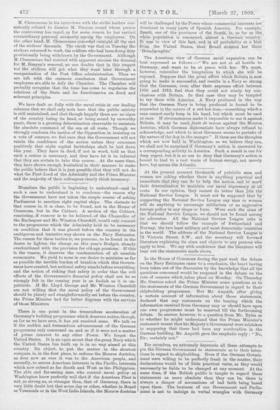Meantime the public is beginning to understand—and in such a
case to understand is to condemn—the reason why the Government have not taken the simple course of asking Parliament to enaction eight capital ships. The obstacle to that course is, it is clear, to be found, not in the House of Commons, but in the Cabinet. A section of the Cabinet, consisting, if rumour is to be believed, of the Chancellor of the Exchequer and Mr. Winston Churchill, would only consent to the programme which the Admiralty held to be necessary on condition that it was placed before the country in the ambiguous and tentative way shown in the Navy Estimates. The reason for these tactics is, we presume, to be found in the desire to lighten the charge on this year's Budget, already overburdened with the provision for old-age pensions. If this is the reason, it deserves the condemnation of all sensible economists. We yield to none in our desire to minimise as far as possible the terrible burden of taxation which this Govern- ment have greeted, but national safety stands before everything, and the notion of risking that safety in order that the evil effects of the Government's financial policy shall not be so strongly felt in the coming year is as foolish as it is un- patriotic. If Mr. Lloyd George and Mr. Winston Churchill are not willing that the naval policy of the Government should be plainly and straightforwardly set before the country, the Prime Minister had far better dispense with the services of those Ministers.










































 Previous page
Previous page